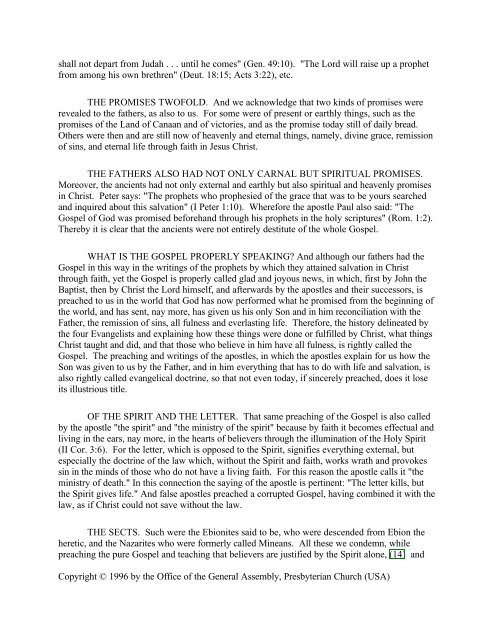The Book of Confessions - The Presbyterian Leader
The Book of Confessions - The Presbyterian Leader
The Book of Confessions - The Presbyterian Leader
Create successful ePaper yourself
Turn your PDF publications into a flip-book with our unique Google optimized e-Paper software.
shall not depart from Judah . . . until he comes" (Gen. 49:10). "<strong>The</strong> Lord will raise up a prophet<br />
from among his own brethren" (Deut. 18:15; Acts 3:22), etc.<br />
THE PROMISES TWOFOLD. And we acknowledge that two kinds <strong>of</strong> promises were<br />
revealed to the fathers, as also to us. For some were <strong>of</strong> present or earthly things, such as the<br />
promises <strong>of</strong> the Land <strong>of</strong> Canaan and <strong>of</strong> victories, and as the promise today still <strong>of</strong> daily bread.<br />
Others were then and are still now <strong>of</strong> heavenly and eternal things, namely, divine grace, remission<br />
<strong>of</strong> sins, and eternal life through faith in Jesus Christ.<br />
THE FATHERS ALSO HAD NOT ONLY CARNAL BUT SPIRITUAL PROMISES.<br />
Moreover, the ancients had not only external and earthly but also spiritual and heavenly promises<br />
in Christ. Peter says: "<strong>The</strong> prophets who prophesied <strong>of</strong> the grace that was to be yours searched<br />
and inquired about this salvation" (I Peter 1:10). Wherefore the apostle Paul also said: "<strong>The</strong><br />
Gospel <strong>of</strong> God was promised beforehand through his prophets in the holy scriptures" (Rom. 1:2).<br />
<strong>The</strong>reby it is clear that the ancients were not entirely destitute <strong>of</strong> the whole Gospel.<br />
WHAT IS THE GOSPEL PROPERLY SPEAKING? And although our fathers had the<br />
Gospel in this way in the writings <strong>of</strong> the prophets by which they attained salvation in Christ<br />
through faith, yet the Gospel is properly called glad and joyous news, in which, first by John the<br />
Baptist, then by Christ the Lord himself, and afterwards by the apostles and their successors, is<br />
preached to us in the world that God has now performed what he promised from the beginning <strong>of</strong><br />
the world, and has sent, nay more, has given us his only Son and in him reconciliation with the<br />
Father, the remission <strong>of</strong> sins, all fulness and everlasting life. <strong>The</strong>refore, the history delineated by<br />
the four Evangelists and explaining how these things were done or fulfilled by Christ, what things<br />
Christ taught and did, and that those who believe in him have all fulness, is rightly called the<br />
Gospel. <strong>The</strong> preaching and writings <strong>of</strong> the apostles, in which the apostles explain for us how the<br />
Son was given to us by the Father, and in him everything that has to do with life and salvation, is<br />
also rightly called evangelical doctrine, so that not even today, if sincerely preached, does it lose<br />
its illustrious title.<br />
OF THE SPIRIT AND THE LETTER. That same preaching <strong>of</strong> the Gospel is also called<br />
by the apostle "the spirit" and "the ministry <strong>of</strong> the spirit" because by faith it becomes effectual and<br />
living in the ears, nay more, in the hearts <strong>of</strong> believers through the illumination <strong>of</strong> the Holy Spirit<br />
(II Cor. 3:6). For the letter, which is opposed to the Spirit, signifies everything external, but<br />
especially the doctrine <strong>of</strong> the law which, without the Spirit and faith, works wrath and provokes<br />
sin in the minds <strong>of</strong> those who do not have a living faith. For this reason the apostle calls it "the<br />
ministry <strong>of</strong> death." In this connection the saying <strong>of</strong> the apostle is pertinent: "<strong>The</strong> letter kills, but<br />
the Spirit gives life." And false apostles preached a corrupted Gospel, having combined it with the<br />
law, as if Christ could not save without the law.<br />
THE SECTS. Such were the Ebionites said to be, who were descended from Ebion the<br />
heretic, and the Nazarites who were formerly called Mineans. All these we condemn, while<br />
preaching the pure Gospel and teaching that believers are justified by the Spirit alone, (14) and<br />
Copyright © 1996 by the Office <strong>of</strong> the General Assembly, <strong>Presbyterian</strong> Church (USA)




